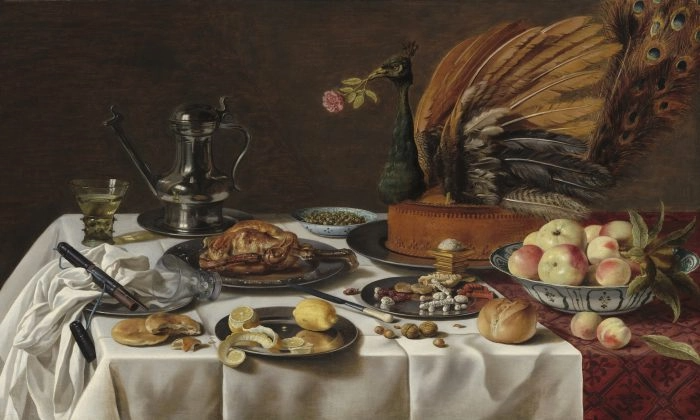As the fall season nears its close, and with Thanksgiving and holiday get-togethers fast approaching, celebratory feasts are on the minds of many. For many, these get-togethers are either the highlight or the lowlight of the season, but almost everyone would agree they are impactful in some way.
Personally, these feasts have always been fine, but they’ve never meant the world to me. My disinterest was a combination of extended families growing more disparate, educating myself more on the background of Thanksgiving, and greater interest in other things, I think. Last Thanksgiving, for example, my direct family decided to skip the celebration and spend the break in Idyllwilde. I remember feverishly running my Valentine monologue in our mountain cabin, preparing for an upcoming Romeo and Juliet audition. This holiday break, too, my parents surprised me with a trip to Stratford Upon Avon, the birthplace of William Shakespeare. We will be in England while the extended family gathers once more for Thanksgiving.
Suffice to say, the Bard’s plays have come to be associated with the feasting holiday season to me. So, what can his works tell us about such tradition? Did Shakespeare stress the importance of communion in feast, or did he let it become literary leftovers? In this article, I will be examining dining traditions in a few of Shakespeare’s most prevalent plays, to see what he might be telling us about this annual ritual.
Feasting norms have been subverted since early in Shakespeare’s works. In his earliest and most gruesome tragedy, Titus Andronicus, a bloody dinner serves as the central point of the play’s revenge plotline. Titus, a roman war hero, plays “the Cook” as he calls himself, and serves his enemy, Tamora, a pie made from her own sons. This shockingly grotesque scene instantly separates the decorum of feasting from the act in this play. Shakespeare demonstrated right off the bat that he did not view feasts as merely joyful and connective. More often, in fact, he presents them as quite the opposite.
Another of Shakespeare’s most prominent feasts comes in the form of Macbeth’s banquet scene. In this renowned tragedy, Macbeth and his wife rise to the Scottish throne on the bloody backs of their enemies. The couple begins with the murder of the last king, Duncan, but as Macbeth grows paranoid, he is also driven to kill his close friend Banquo, whom he believed was conspiring against him. Soon after, they host a “solemn supper” wherein Macbeth and his wife agree to be “bright and jovial,” disguising their guilt with “hearty welcome.” However, shortly into the feast, Macbeth is confronted by the vengeful ghost of Banquo. Although Lady Macbeth tries to calm the guests, Macbeth’s panicked shouts throw the dinner into disarray, ending the night prematurely. This scene is an example of the supposed principals of a feast conflicting with the characters’ realities. Ideally, a feast is a gathering of connection and sincerity. This is the meeting Macbeth and his wife planned. Upon the appearance of Banquo, though, Macbeth’s true self is revealed. This is an example of Shakespeare showing that in a feast, honesty and goodheartedness is a necessity: even if the facade of cordiality is maintained, without heart behind it, the feast devolves rapidly.
The importance of connection in dining celebrations continues throughout many of his other plays. In Hamlet, for instance, the prince’s conniving uncle hosts a wedding celebration with Hamlet’s widowed mother. Although many of the other guests are content, Hamlet refuses to accept the joy of the night. As he sees it, “the funeral baked meats did coldly furnish forth the marriage tables,” and he cannot play along with the show of good nature. Hamlet views the pair as disrespectful toward his late father, and therefore rejects the connection which should accompany a feast, once again demonstrating the importance of honesty in these events.
However, not all shared meals end poorly in Shakespeare’s works. Occasionally, the goodness of connection has a chance to shine through a feast. In As You Like It, the starving Orlando, wandering through the forest, discovers a group of Robin Hood-esque men. They are sharing a meager meal, but do so happily, loudly singing and dancing. Desperate, he accosts them, threatening their lives for their food. However, they offer it to him freely: “What would you have? Your gentleness shall force, more than your force move us to gentleness…Sit down and feed, and welcome to our table.” Orlando was expecting the worst from this group, but their kindness and peace shocks him. Despite their relative lack of food, this occasion is closer to a true feast than any of the grander occasions in the Bard’s tragedies.
It comes as no surprise that in Shakespeare’s works, which are so concerned with the truth of humanity and our experiences, that love and connection are often at the center of his feasts. For all the decorum of dining, rarely is attention given to the food itself. The meal may sooner be replaced with stones and warm water–as in Timon of Athens–or as a metaphor for connection itself in Twelfth Night. As the love-struck Orsino swoons: “If music be the food of love, play on.” To Shakespeare, what matters is not the food on the table or where the food is shared, but it is those the meal is shared with, and the openness of the connection that comes with it. In a line from The Comedy of Errors, Shakespeare’s lesson for this time of year is made clear: “small cheer and great welcome makes a merry feast.”

